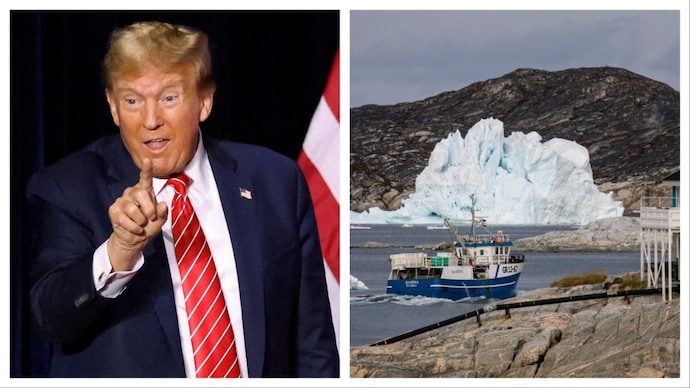Donald Trump Revives Interest in Greenland
Donald Trump has once again brought Greenland into the spotlight, renewing his interest in acquiring the massive Arctic island. This move comes after his controversial demand for the Panama Canal’s return to U.S. control, further fueling debates about American expansionism under his leadership. Trump’s recent statement emphasizes Greenland’s strategic importance to U.S. national security and global freedom, reigniting conversations about its geopolitical relevance and natural resources.
Trump’s fascination with Greenland is not new. During his first term as President (2017–2021), he floated the idea of purchasing Greenland, citing its vast natural resources and strategic location near the Arctic. At the time, his proposal was met with severe backlash from Denmark, which controls Greenland, and Greenlandic leaders themselves.
On Truth Social, Trump recently declared:
“For purposes of national security and freedom throughout the world, the United States of America feels that the ownership and control of Greenland is an absolute necessity.”
This statement came alongside the announcement of Ken Howery, PayPal’s co-founder, as the U.S. Ambassador to Denmark, a move signaling Trump’s continued focus on improving U.S. relations with the Kingdom of Denmark. Greenland, while having autonomous self-rule, remains part of Denmark’s kingdom, adding complexity to Trump’s proposal.
Greenland’s Geopolitical Importance
Greenland is the largest island in the world that is not a continent. Though part of the North American continent, it is geopolitically tied to Europe due to its connection with Denmark and the EU. The island’s strategic position in the North Atlantic Ocean makes it crucial for Arctic exploration, military operations, and resource extraction.
The U.S. already has a significant presence in Greenland through the Pituffik Space Base (formerly Thule Air Base) on the island’s northwest coast. This base plays a pivotal role in missile warning systems, satellite tracking, and space surveillance, underlining Greenland’s value to U.S. defense strategies.
Greenland’s natural resources, including rare earth minerals, oil, and gas, further enhance its appeal to global powers like the United States and Russia. As climate change makes Arctic routes and resources more accessible, the competition for influence in Greenland has intensified, with nations like Russia vying for greater control in the region.
Denmark’s Firm Stance: “Greenland is Not for Sale”
Trump’s renewed interest in Greenland echoes his earlier attempt in 2019 to purchase the territory. That effort was met with strong opposition from Denmark and Greenland’s leadership. Danish Prime Minister Mette Frederiksen firmly dismissed the idea at the time, stating:
“Greenland is not for sale. Greenland is not Danish. Greenland belongs to Greenland.”
Her remarks prompted Trump to cancel a scheduled meeting with Frederiksen, further straining U.S.-Denmark relations. Greenland’s leaders have also consistently reiterated their autonomy, emphasizing that decisions about their territory rest with Greenlandic authorities, not Denmark or external powers.
The U.S. and Greenland: A Historical Relationship
The United States has long recognized Greenland’s strategic importance. During World War II, the U.S. established military bases in Greenland to counter potential Axis advances. The Cold War further cemented Greenland’s role as a critical location for monitoring Soviet activity in the Arctic.
Today, the U.S. maintains a significant presence in Greenland through its space base, and Greenlandic waters remain vital for transatlantic shipping and military operations. However, buying Greenland outright would represent an unprecedented shift in the relationship between the U.S., Denmark, and Greenland.
Trump’s Greenland comments came shortly after his controversial statements about the Panama Canal. He demanded that Panama return control of the canal to the U.S., calling the current passage fees “ridiculous.” The Panama Canal, completed by the U.S. in 1914, was under American control until it was handed over to Panama on December 31, 1999, as part of treaties signed in 1977.
Panama’s President Jose Raul Mulino rejected Trump’s demand, stating that the canal’s control and independence were non-negotiable. Mulino defended the passage fees as fair and not arbitrarily set, rebuking Trump’s claims. The U.S. remains the canal’s largest user, underscoring its continued economic and strategic importance.
Both Greenland and the Panama Canal represent vital strategic assets in terms of geography, resources, and influence.
- Greenland: Its location near the Arctic is critical for military surveillance, resource extraction, and emerging shipping routes due to melting ice caps.
- Panama Canal: The canal is indispensable for global trade, serving as a crucial passageway for ships traveling between the Atlantic and Pacific Oceans.
Trump’s focus on these territories highlights his vision of reinforcing U.S. global influence through control of strategic assets. However, his approach has drawn criticism for its aggressive tone and lack of diplomatic finesse.
While Trump’s interest in Greenland reflects long-standing U.S. strategic priorities, acquiring the territory would be fraught with challenges.
- International Backlash: Denmark and Greenland’s leadership have categorically rejected any notion of a sale, making diplomatic negotiations difficult.
- Autonomy of Greenland: As a self-governing territory, Greenland’s people would have the final say in any transfer of sovereignty.
- Global Implications: A U.S. acquisition of Greenland could escalate tensions with other Arctic powers like Russia and Canada, complicating geopolitical dynamics in the region.
Similarly, Trump’s remarks about the Panama Canal have reignited debates about U.S. interventionism in Latin America, a region with a long history of U.S. influence and control.
Donald Trump’s renewed interest in Greenland and his demand for control of the Panama Canal reflect his broader vision of strengthening U.S. global dominance. While these territories are undoubtedly valuable, Trump’s approach has sparked controversy, raising questions about the feasibility and ethics of such ambitions.
Greenland’s leadership and Denmark remain firm in their opposition to any sale, and Panama has asserted its sovereignty over the canal. As Trump prepares for his next term as President, these contentious proposals may further test his administration’s diplomatic capabilities and global relationships.


Comments are closed.